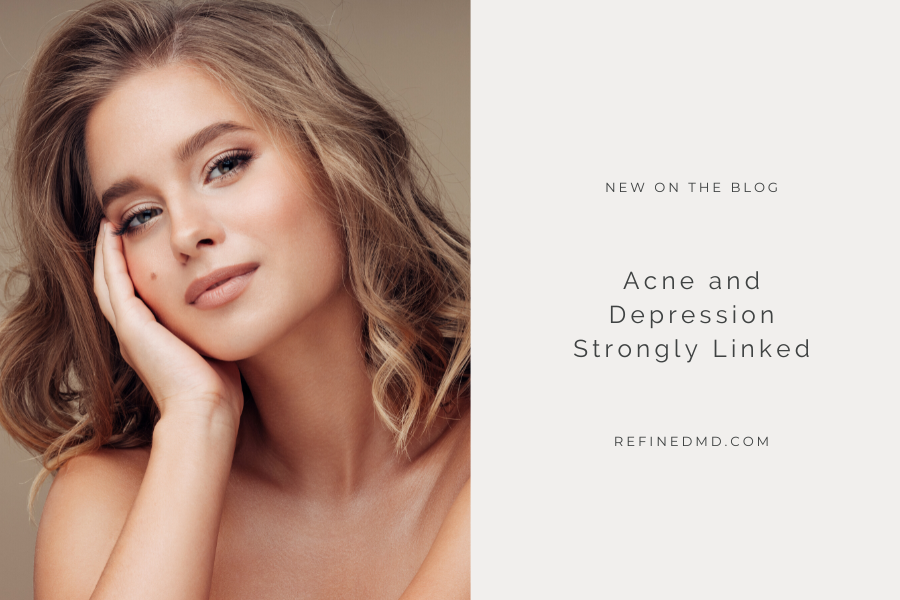
03 Dec Acne: You’re Not Alone
Acne is a well-known and often long-term skin disease that many people struggle with, but that doesn’t make it any easier to accept. It is one of the top reasons clients seek out RefinedMD, your clinic that specializes in bridging the gap between medical and cosmetic dermatology. Acne may be caused from a variety of factors, including genetics in 80 percent of cases as well as hormone fluctuations and environmental causes. Fortunately, there are treatments.
Acne holds the title of most common skin condition in the U.S. It is un-biased, affecting all ages, sexes, and races. When hormones are not balanced, the sebaceous (oil) glands can be overactive. The oil designed to hydrate and protect skin can become clogged in a pore and mix with dead skin cells. This is the perfect breeding ground for bacteria, which triggers an inflammatory response. The acne cascade process is what leads to tell-tale red pimples. However, pimples are merely a symptom of acne.
All About Acne
There are various types and degrees of acne, ranging from mild to painful cysts. Of the 60 million people in the country suffering from acne, 20 percent have experienced acne serious enough to cause scarring. Recently, researchers found that 85 percent of people in the U.S. have had acne at some point in their life, and women make up 80 percent of acne cases in adults (likely due to the role hormones play in acne).
In the last decade, the average age of acne patients has increased from 20.5 to 26.5 years. This may be due to changes in birth control and hormonal trends, or perhaps because those in their twenties are not seeing a dermatologist as often as they did ten years ago. However, not seeing a dermatologist is a mistake. Acne can damage mental health, with 96 percent of acne sufferers saying they feel depressed because of their acne. It is reported in a survey that 46 percent of people with acne have suffered lower self-esteem and 31 percent have turned down social invitations because they are too self-conscious.
Depression, Acne, and You
Unfortunately, most people (99 percent) experience acne on their face. Sixty percent report acne on other body parts, usually the buttocks and back. However, 15 percent say they have acne on their chest. Athletes and those who are very active are more likely to have bodily acne. Thirty percent of acne sufferers purchase over the counter products, but these products often don’t have the strength and ingredients necessary to truly address acne.
Acne can be much more than an embarrassing and painful condition. We have seen a large increase of acne sufferers who experience increased rates of depression due to their acne in our clinic recently. According to CNN, acne and depression “feed on one another,” and this theory is supported by a number of studies.
How Does Acne Hurt You?
The connection between acne and depression is not as straightforward as many people think. Acne is particularly prevalent in teens, and in some cases may be attributed to ingredients in certain acne medications. Others, such as researchers who published their findings in the British Medical Journal, say that acne itself increases the risk of depression and even suicide attempts.
The skin is the biggest organ of the body, and it’s part of our first impression. Although teens are often associated with acne, it can happen to anyone at any point in their lives. Hormones and genetics certainly play a role, but acne can also be caused by bacteria in clogged pores and an increase in oil production. Still, just because a person has acne does not mean their face is “dirty.”
Teens and Acne
It is unsurprising that teenagers with acne report higher incidents of depression compared to adults. The teen years are rough, and they are more likely to be made fun of by their peers while simultaneously depending on external validation to assess their self-worth. According to psychologist Bobbie McDonald, even when acne remains after high school, depression rates begin to lower. Teens begin to redefine themselves in more positive ways beyond the state of their skin.
Although self-esteem gets better post-high school, it remains a fact that acne and depression have a close, complicated relationship. Diagnosable depression is a chemical imbalance in the brain, and it can become exacerbated with tertiary issues such as acne. In some cases, treating acne can help to relieve depression. However, a person with diagnosable depression requires treatment from a mental health professional.
RefinedMD customizes acne treatment plans to each individual. Connect with us today by calling the office or completing the online form, and begin a journey towards clearer, healthier skin.
